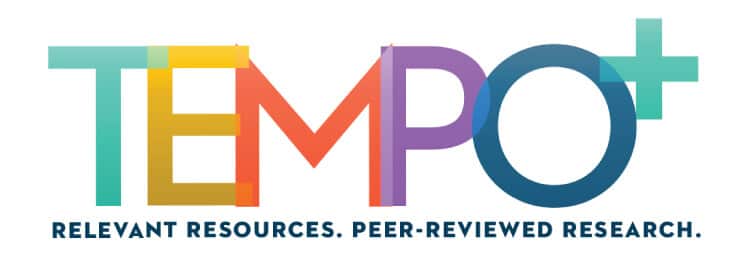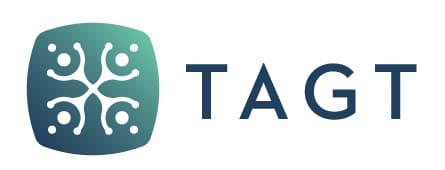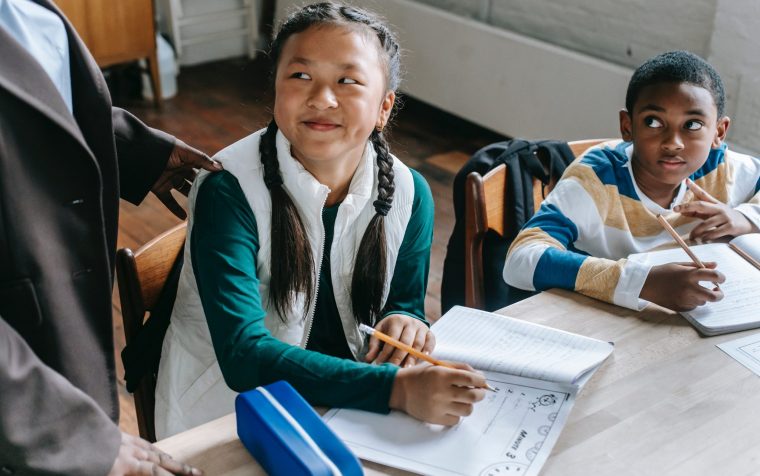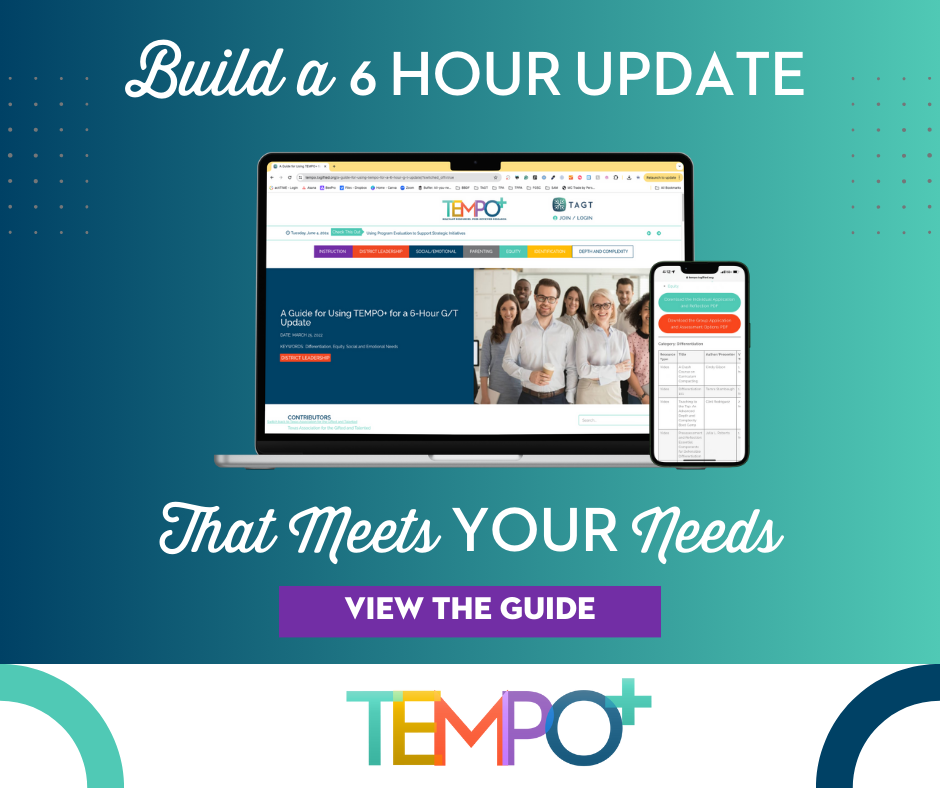Schools across the nation continue to grapple with ways in which they can best serve their students and families while considering the health and safety of students, faculty, and staff. In Texas, many districts have relied on remote learning in the fall as part of their plan to return to school and many will continue this in the spring. To do this requires that administrators think strategically about how to use their resources to best serve their communities. These resources include the gifted education specialists at the district and school levels. These specialists are trained in all aspects of gifted education and can provide valuable supports to schools as they work to ensure fidelity of gifted services that adheres to the Texas State Plan; to general education teachers so that they can continue to differentiate instruction to meet the needs of students; and to families as they juggle the demands created by these unusual times. Here we outline five recommendations for school administrators to utilize their gifted specialists.
1: Identification of Students for G/T Services: Gifted specialists are a valuable resource to work with teachers and administrators to provide guidance in recognizing the varied characteristics of giftedness across populations.
As schools move into an online/virtual learning environment, it is necessary that students with gifts and talents continue to be identified and served. This is especially important for those students from low-income families, students who are culturally and linguistically diverse, or those who are twice exceptional. Youth in these groups who achieve at the highest levels are less likely to persist as high achievers, are twice as likely to drop out of high school, less likely to attend selective colleges, and less likely to graduate college (Wyner, Bridgeland, & DiIulio, 2009). Teachers are often “gatekeepers” in the referral process, yet often lack full understanding of the unique characteristics related to giftedness that can be manifested by these students. Gifted specialists can use this time to work with teachers and administrators to provide guidance in recognizing the varied characteristics of giftedness across these populations. Tools like The Varied Face of Gifted/Talented Students (Slocumb & Olenchak, 2006) can be useful in this learning process.
2: Programming and Differentiation: Gifted specialists can be a powerful resource as teachers work to ensure that differentiation continues in a virtual learning environment.
In Texas, we are guided by the Texas State Plan for the Education of Gifted/Talented Students (Texas Education Agency, 2019) found on the Texas Education Agency (TEA) website. The familiar program models of “full-time inclusion, push-in, pull-out, full-time gifted only, and special day schools or programs” (Austin, 2020, para. 1) align with TEA’s District-Level Indicator Codes. The former are excellent resources, yet we are left wondering what programs and differentiation will look like during COVID 19.
Gifted specialists can be a powerful resource as teachers work to ensure that differentiation continues in a virtual learning environment. Keep in mind that “key aspects of teaching in a face-to-face classroom may look different in an online classroom, but one thing that holds constant is the importance for teachers to meet the needs of all students” (Beasley & Beck, 2017, p. 551). Although these researchers pointed out that the literature is limited on how differentiation looks in an online environment, our concept of best practices remain in place. The International Association for K-12 Online Learning offered through The Aurora Institute provides teachers with guidelines on how to promote student success through regular feedback, give prompt responses and clear expectations, remain responsive to students with special needs, and use assessment data to modify instructional methods and content. Tools like Universal Design for Learning (UDL) can be used as you plan for multiple means of representation, action and expression, and engagement (Beasley & Beck, 2017). Tomlinson (2014) reminded us an educator can differentiate by readiness, interest, or learning profile. Additionally, factors such as gender and culture also need to be considered. Finally, we can differentiate for gifted learners as we meet the needs of the whole child, as suggested by the NAGC.
3: Curriculum and Instruction: Gifted specialists can work with general education classroom teachers to help them plan authentic independent learning experiences.
There has been a renewed focus on equity and culturally responsive teaching in recent years (e.g., Gay, 2018; Hammond, 2015). With the move to an online learning environment, questions of equity and access have become more important than ever. Gifted specialists can support student information processing by including authentic opportunities to “connect to students’ community and everyday lives” (Hammond, 2015, p. 17).
Project Based Learning (PBL) provides an opportunity for gifted specialists to support teachers, students, and to reach into the community. Gifted specialists can work with general education classroom teachers by helping them develop relevant PBL topics, identify the learning objectives and goals, map out the learning process, and plan for assessment. The specialist can provide support for students by helping them identify and procure any necessary resources as they exhibit their learning, reflect on the process, and transfer their knowledge (Thomas & Davidson, 2013).
PBL allows teachers to facilitate authentic independent learning. Two examples of free, elementary and secondary curriculum based PBLs are the Texas Performance Standards Project (TPSP) and Speak Up, Speak Out! (SUSO).
The purpose of the TPSP is to provide students with choice, authentic learning experiences, and to practice creating high-quality presentations of their work. According to the TPSP website, utilizing a TPSP task “provides a way to align the curriculum so that a school or district has a true continuum of G/T services” (para. 6). Now in its twentieth year, the Texas Essential Knowledge and Skills (TEKS)-aligned TPSP includes a variety of fully developed, teacher and student friendly tasks for Kindergarten through twelfth grade. Most are interdisciplinary. All can be used independently or can be combined with existing curriculum.
Similar to the TPSP is the Speak Up, Speak Out! (SUSO) project from The University of Texas-Austin’s Annette Strauss Institute for Civic Life. A civics-based project developed to empower students’ voices, SUSO is “designed to teach third grade through high school students about their communities and equip them with the tools to make a difference” (para. 1). Working in teams, students identify community issues, identify root causes, and create actionable solutions. Professional development and full curriculum and support are provided as students work towards the State Civics Fair held yearly at the Capitol building in Austin.
4: Professional Learning: Gifted specialists have a deep understanding of G/T students, instruction, and differentiation. As such they can support the adult learning environment on your campus(es) to ensure all educators who interact with G/T students can facilitate their learning needs.
Sustained professional learning is necessary to increase awareness of the needs of gifted children. Gifted specialists can facilitate growth experiences through a systematic, job-embedded book study process that includes the elements of study, select, implement, analyze, and adjust (Fugate & Bower, 2019; Southwest Educational Development Laboratory, 2008). These types of professional learning experiences can be easily facilitated in person and virtually and allows participants to select and implement a variety of strategies in the learning environment and then come together to reflect on and analyze their effectiveness with a focus on how to best adjust these strategies to effectively meet the needs of the students in their classroom.
5: Family and Community: Gifted specialists can support the families in their school communities who may wonder how to support their gifted students as they attempt to handle the stressors of our current reality.
Gifted specialists can support the families in their school communities who may wonder how to support their gifted students as they attempt to handle the stressors of our current reality. The National Association for Gifted Children (2020) created a resource that helps parents understand how they can support their child during Covid-19. Burns (2018) noted, “Digital tools let us capture student voice, change the way students interact with the world, and provide an audience for children of all ages” (p. 2). Using technology for these purposes, gifted specialists can facilitate engagement with experts in the community as a way to expand students’ background knowledge and specific skills. For example, an authentic experience such as a writing contest gives students a near-professional reason to write. Bringing in authors, agents, or editors to speak remotely with students allows them to interact with those industry professionals in an authentic manner.
References
Austin, M. (2020). But how will we serve them now? Academity. https://medium.com/academity/but-how-will-we-serve-them-now-4e3dda0e054
Beasley, J., & Beck, D. (2017). Defining differentiation in cyber schools: What online teachers say. TechTrends: Linking Research & Practice to Improve Learning, 61(6), 550–559. https://doi-org.tamuct.idm.oclc.org/10.1007/s11528-017-0189-x
Burns, M. (2018). Tasks before apps: Designing rigorous learning in a tech-rich classroom. Association for Supervision and Curriculum Development.
Fugate, C. M., & Bower, J. (2019). Attention divergent hyperactive giftedness: From underachieving to achieving. In A. Novak & C. Weber (Eds.), Professional development and teacher preparation in gifted education: Professional learning strategies for special topics. Prufrock Press.
Gay, G. (2018). Culturally responsive teaching: Theory, research, and practice (3rd ed.). Teachers College Press.
Hammond, Z. (2015). Culturally responsive teaching and the brain: Promoting authentic engagement and rigor among culturally and linguistically diverse students. Corwin.
National Association for Gifted Children. (2020). Serving the whole gifted child. http://kagegifted.org/wp-content/uploads/2020/06/NAGC-TIP-Sheet-Whole-Gifted-Child.pdf
National Association for Gifted Children. (2020). Supporting your gifted child during COVID-19. http://kagegifted.org/wp-content/uploads/2020/04/NAGC_TIP-Sheet_COVID-19_With-Strategies-by-Development-Level_April-2020.pdf
Slocumb, P. D. (with F. R. Olenchak). (2006). Equity in gifted education: A state initiative. Texas Education Agency. http://www.gtequity.org/docs/equity_in_ge.pdf
Southwest Educational Development Laboratory. (2008). The professional teaching and learning cycle: Introduction (2nd ed.). Author.
Texas Education Agency. (2019). Texas State Plan for the Education of Gifted/Talented Students. https://tea.texas.gov/sites/default/files/GT_State_Plan_2019_1.pdf
Thomas, L. R., & Davidson, J. (2013). Facilitating authentic learning, grades 6-12: A framework for student-driven instruction. Corwin.
Tomlinson, C. A. (2014). The differentiated classroom: Responding to the needs of all learners. Association for Supervision and Curriculum Development.
Wyner, J. S., Bridgeland, J. M., & DiIulio, J. J., Jr. (2009). Achievement trap: How America is failing millions of high-achieving students from lower-income families. Lansdowne, VA: Jack Kent Cooke Foundation. Retrieved from http://www.jkcf.org/news-knowledge/research-reports/
For fourteen years, Katie Drake has worked with gifted and talented students in elementary and secondary schools. Katie’s background includes teaching k-5 gifted pull-out classes, teaching middle school STEM and ELAR, writing her own young adult fiction, and working as a secondary teacher instructional coach. Katie is currently working towards her master’s degree in education leadership.
C. Matthew Fugate is assistant professor, Educational Psychology, at the University of Houston-Downtown. He received his doctorate in Gifted, Creative, and Talented Studies from Purdue University. Previously, Matthew worked as an elementary teacher, Gifted Coordinator, and Magnet Coordinator in HISD. His research interests include twice-exceptional students and students from underserved populations. Matthew has presented to audiences nationally and internationally on topics including twice exceptionality, Total School Cluster Grouping, affective development, and creativity.






